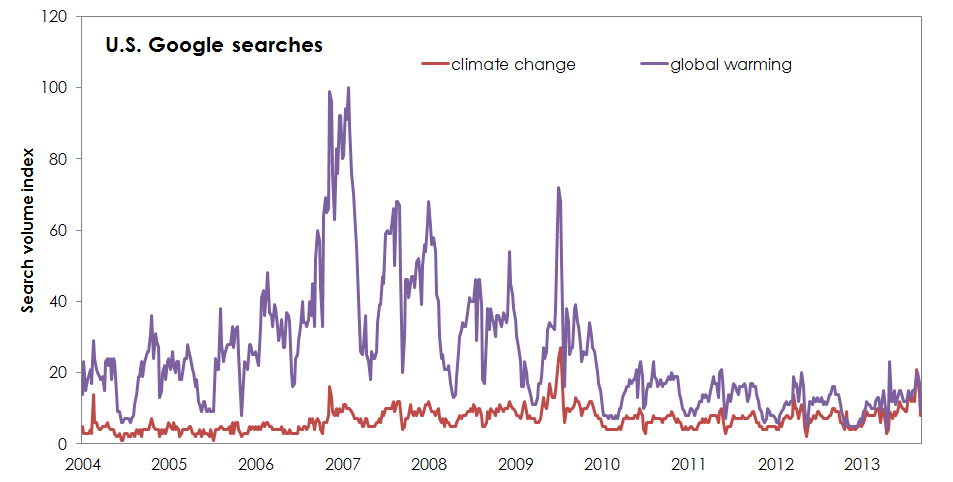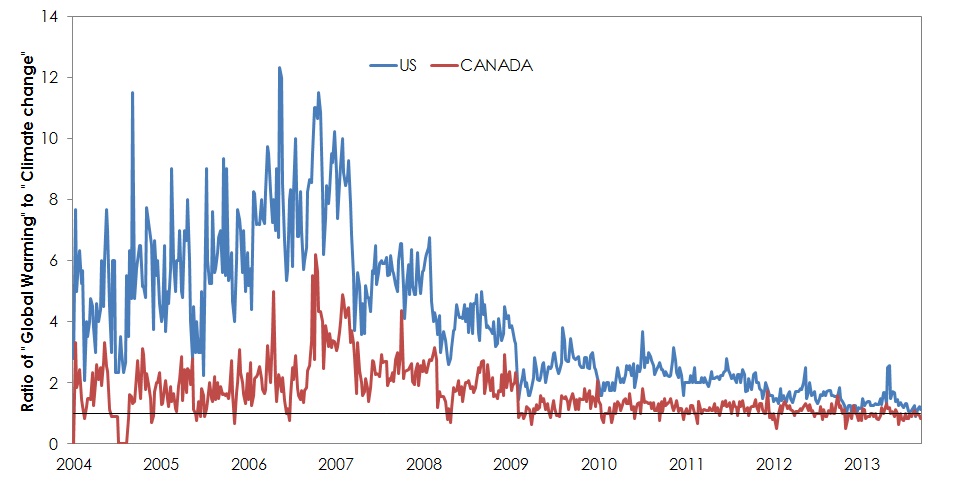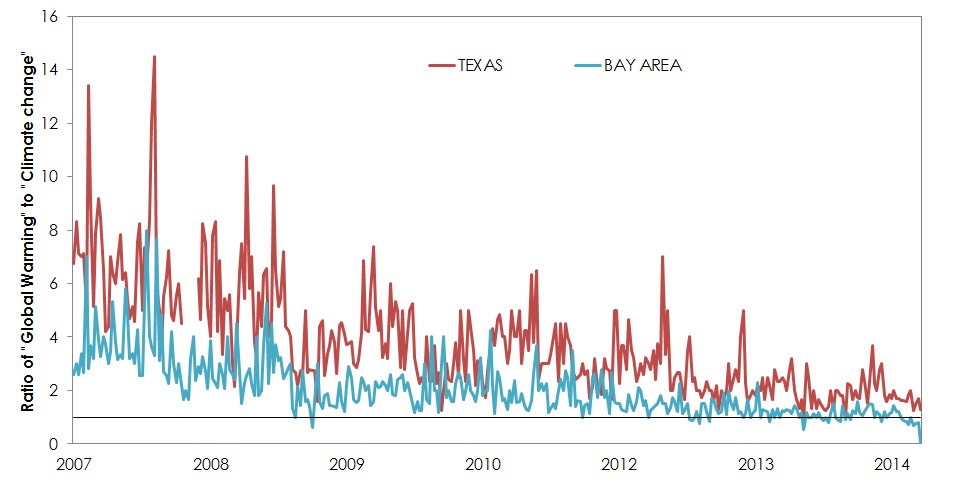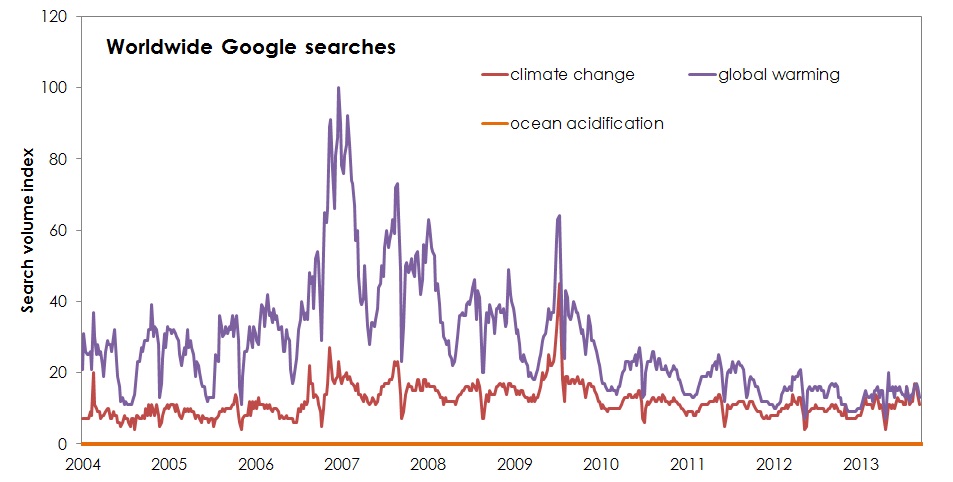For years, people have argued over the best term to describe what is happening to the climate: global warming or climate change.
Market-savvy environmental groups have tried re-branding the issue entirely, producing terms like global heating, global weirding, global melting, climate crisis, climate disruption, climate chaos, springtime for CO2, climate farklempt, I’ve got some coastline in Florida to sell, etc. etc. The two originals, global warming and climate change, continue to corner the market like the Coke and Pepsi of the climate world.
A recent study by the Yale Project on Climate Change Communication found that global warming is more “effective” from a communications standpoint than climate change. Detailed public opinion analysis showed that “global warming” instills more concern about the issue and generates more motivation to take action.
The study also points out that the American public has for years used global warming far more than climate change, at least according to Google search data. However, if you dig further into the search data, you find some changing patterns.
Here is the U.S. search volume going back to 2004:
 Global warming certainly dominated the “aughts”. Since then, its relative use has declined. If we look at the ratio of searches for global warming and climate change in the above data, you see that word preferences have been changing:
Global warming certainly dominated the “aughts”. Since then, its relative use has declined. If we look at the ratio of searches for global warming and climate change in the above data, you see that word preferences have been changing:
 In the US (blue), the ratio has declined towards the 1:1 line (black), meaning that today there is close to an equal proportion of searches for global warming and climate change. That’s a big change since the mid-2000s, when global warming vs. climate change was like the Harlem Globetrotters vs. the Washington Generals.
In the US (blue), the ratio has declined towards the 1:1 line (black), meaning that today there is close to an equal proportion of searches for global warming and climate change. That’s a big change since the mid-2000s, when global warming vs. climate change was like the Harlem Globetrotters vs. the Washington Generals.
In Canada, global warming was never nearly as dominant term north of the border. Climate change is now searched more often (52% of combined searches in 2014). This is no surprise to Canadians; the term climate change was adopted here years ago by most political parties and the media. That decision probably reflects the more moderate Canadian political climate, where people are more likely to trust authority, in this case, scientists and their preferred term. Granted, it also may reflect the actual climate; the term “global warming” may be scary if you live in Phoenix, but dreamy if you live in Winnipeg.
Narrowing the U.S. search data by region shows a huge geographic divide in the preferred term and the interest in the subject. For example, the next graph compares the search ratio for Texas and for the Bay Area. I tried using individual metropolitan areas in Texas and other conservative states, like Dallas-Ft. Worth or Houston, but none featured consistently high enough search volume for the past ten years. As it is, the Texas data had large gaps before 2007 (and one in 2008), when search volume was too low for the Google metric.
 The ratio is dropping in both Texas and the Bay Area. Texans, however, still prefer global warming by 2:1 or more over climate change. People in the Bay Area, however, are almost evenly split (52% global warming in 2014).
The ratio is dropping in both Texas and the Bay Area. Texans, however, still prefer global warming by 2:1 or more over climate change. People in the Bay Area, however, are almost evenly split (52% global warming in 2014).
If you examine the overall data state by state, a clear pattern emerges. Republican-leaning states in the southeast and central U.S. have the highest global warming to climate change search ratio, whereas Democratic-leaning states have the lowest ratio. Texas is actually not even among the top ten in global warming preference.  Washington DC is the only “state” where climate change is the preferred term, no doubt related at least in part to its use in government.
Washington DC is the only “state” where climate change is the preferred term, no doubt related at least in part to its use in government.
Harry Enten at fivethirtyeight came to a somewhat similar conclusion using data from U.S. Congress and cable news channels. Enten found that democrats prefer “climate change” and Republicans prefer “global warming”. He then argues that the Yale research would recommend the exact opposite:
If the polling is to be believed, Democrats, Republicans and the news channels they watch are actually having the opposite effect they are intending. We’ll have to see whether the Yale study makes them reverse course.
There are many unresolved questions, including whether the influence noted in the Yale Study is changing over time, and what that means for language choices. Does the choice of wording matter among people who are already motivated, like many in the Bay Area, or those whose attitudes are unlikely to change? And would re-labeling by either party be so obvious to the public as to undermine the objective?
Regardless of the answers, one thing is clear from the search data. We are not paying nearly enough attention to ocean acidification:

The IPCC was set up in 1988, so IMO that gave a strong hint as to the correct terminology.